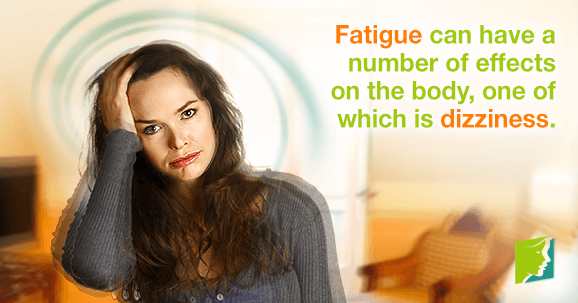Menopause causes a variety of symptoms, some of which are more well-known than others. During perimenopause, a decline in the production of hormones, such as estrogen and progesterone, cause numerous physical and emotional changes to occur in the body, including hot flashes and mood swings. Most women understand and expect these symptoms, but other, lesser-known symptoms, like dizziness and fatigue, can be confusing. Keep reading to learn why fatigue and associated dizziness occur during menopause, how they can affect a woman's well-being, and what can be done to prevent them.
What Is Fatigue?
Adults require between six to eight hours of sleep per night. This is considered the amount of time necessary for the body to replenish energy and concentration levels spent during the day. Regularly falling short of the recommended hours of sleep can result in extreme tiredness, known as fatigue.
Fatigue refers to physical and mental exhaustion. Physical fatigue might be felt in aching muscles and low energy levels, and mental exhaustion refers to a desire to sleep, low concentration levels, and irritability. Both types of fatigue are associated with menopause, where changes in hormone levels affect a woman's ability to sleep deeply or her ability to fall asleep in the first place. Other menopause symptoms, such as night sweats and depression, can also contribute to fatigue.
Fatigue and Dizziness
Fatigue can have a number of physiological effects, one of which is dizziness. Dizziness has two forms: the first is a sensation of lightheadedness or faintness that causes you to feel as though you may pass out. The second is vertigo, which is the medical term for the sensation that you or the things around you are moving even when they are not. These feelings can be disorienting, distressing, and can sometimes result in nausea or vomiting.
How to Prevent Fatigue
It is important to fight fatigue in order to minimize dizzy spells, ensure maximum energy and concentration levels during the day, and strengthen general immunity. Studies have also shown that those who suffer from fatigue have a greater risk of infertility, type 2 diabetes, and heart disease.
Preventing fatigue requires a combination of environmental, habitual, and dietary changes. It is a good idea to cut dietary triggers - such as caffeine, alcohol, and spicy foods in the evening - to promote restful sleep.
Exercise could have a regulating effect on the hormones whose fluctuation results in fatigue over time. While you may think you are too tired to exercise, it is worth making the effort to go for a walk or to the gym, because in the long run, physical activity will promote more restful sleep. It is best to exercise during the day to avoid stimulating activity affecting your ability to sleep well during the night.
It's easy to underestimate the importance of a good night's sleep, especially if you have a busy lifestyle. However, to prepare your body for this lifestyle, both mentally and physically, it is vital to ensure you get enough rest. When dizzy spells and vertigo occur, your body is sending a clear signal that it is being strained. Prioritize your fatigue with the focus you would give to any other health concern, and make adjustments to your schedule, environment, and diet to ensure you are resting for eight hours every night.
Sources
- Agency of Healthcare Research and Quality. (2005). Management of Menopause-Related Symptoms. Retrieved March 25, 2014, from http://archive.ahrq.gov/downloads/pub/evidence/pdf/menopause/menopaus.pdf
- National Health Service UK. (2013). 10 medical reasons for feeling tired. Retrieved March 25, 2014, from http://www.nhs.uk/Livewell/tiredness-and-fatigue/Pages/medical-causes-of-tiredness.aspx
- National Health Service UK. (2013). Why lack of sleep is bad for your health. Retrieved March 25, 2014, from http://www.nhs.uk/livewell/tiredness-and-fatigue/pages/lack-of-sleep-health-risks.aspx
- Owada, S. et al. (2012). Clinical evaluation of vertigo in menopausal women. Nihon Jibiinkoka Gakkai Kaiho, 115(5), 534-539. Retrieved from http://www.ncbi.nlm.nih.gov/pubmed/22686064



